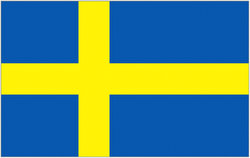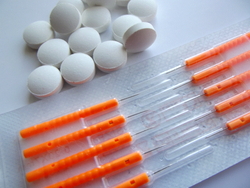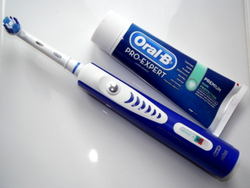 A team led by Lund University, Sweden has shown that a course of acupuncture improves subjective well-being for women being treated for anorexia nervosa. A qualitative analysis was undertaken on interviews from 25 patients, median age 29, taking part in a residential treatment programme. The programme included structured eating, medication, supportive dialogue and restrictions on physical activity. Patients were also offered acupuncture twice a week, in addition to usual care, with additional sessions available on request. Participants took part in the study for between one and twenty-six weeks.
A team led by Lund University, Sweden has shown that a course of acupuncture improves subjective well-being for women being treated for anorexia nervosa. A qualitative analysis was undertaken on interviews from 25 patients, median age 29, taking part in a residential treatment programme. The programme included structured eating, medication, supportive dialogue and restrictions on physical activity. Patients were also offered acupuncture twice a week, in addition to usual care, with additional sessions available on request. Participants took part in the study for between one and twenty-six weeks.
Acupuncture was appreciated by patients: they felt it relieved anxiety and somatic symptoms, benefited both body and mind, eased the struggle to get better, and helped them in all phases of their recovery. It was described as an attractive, personalised part of the programme, and a tool that made it possible for them to influence their own wellness. The authors say “Many participants described how acupuncture could help them relax and get into a pleasant mindful state where they could rest and be themselves…. ‘like getting a nice pause in your brain’. They could observe and process their thoughts, one by one, without provoking stress or a compulsion to act on them. Participants described how acupuncture taught them what it felt like to be relaxed in a natural way…. They experienced that they could concentrate better and focus on issues after acupuncture. The relaxation was described as a new, deep, experience, giving them an inner peace.”
They go on to point out that although patients were offered acupuncture to reduce anxiety and stress, they actually experienced positive somatic side effects including less pain and easing of constipation and other stomach-related complaints.
(Getting Well Is More Than Gaining Weight – Patients’ Experiences of a Treatment Program for Anorexia Nervosa Including Ear Acupuncture. Issues in Mental Health Nursing, 15 January 2020.)
 Researchers at Mashhad University of Medical Sciences in Iran, have found that acupuncture combined with medication for anxiety, produces significantly better treatment responses for the condition, than does medication alone. A total of 112 patients with anxiety were randomised to receive either selective serotonin reuptake inhibitors (SSRIs) alone, or SSRIs plus sham acupuncture, or SSRIs plus true acupuncture. Treatments were administered to the three groups for four weeks, with 12 acupuncture sessions delivered at three per week.
Researchers at Mashhad University of Medical Sciences in Iran, have found that acupuncture combined with medication for anxiety, produces significantly better treatment responses for the condition, than does medication alone. A total of 112 patients with anxiety were randomised to receive either selective serotonin reuptake inhibitors (SSRIs) alone, or SSRIs plus sham acupuncture, or SSRIs plus true acupuncture. Treatments were administered to the three groups for four weeks, with 12 acupuncture sessions delivered at three per week. 
 American authors lead by the University of Detroit, have concluded acupuncture helps dental anxiety. The reviewers surveyed 408 articles, covering over 50000 patients trying 14 different non-pharmaceutical interventions. Acupuncture, acupressure, music, CBT, relaxation and hypnosis were among the most successful. Acupuncture and acupressure, although not widely tested, were given an effectiveness rating of 100%.
American authors lead by the University of Detroit, have concluded acupuncture helps dental anxiety. The reviewers surveyed 408 articles, covering over 50000 patients trying 14 different non-pharmaceutical interventions. Acupuncture, acupressure, music, CBT, relaxation and hypnosis were among the most successful. Acupuncture and acupressure, although not widely tested, were given an effectiveness rating of 100%. A team led by Lund University, Sweden has shown that a course of acupuncture improves subjective well-being for women being treated for anorexia nervosa. A qualitative analysis was undertaken on interviews from 25 patients, median age 29, taking part in a residential treatment programme. The programme included structured eating, medication, supportive dialogue and restrictions on physical activity. Patients were also offered acupuncture twice a week, in addition to usual care, with additional sessions available on request. Participants took part in the study for between one and twenty-six weeks.
A team led by Lund University, Sweden has shown that a course of acupuncture improves subjective well-being for women being treated for anorexia nervosa. A qualitative analysis was undertaken on interviews from 25 patients, median age 29, taking part in a residential treatment programme. The programme included structured eating, medication, supportive dialogue and restrictions on physical activity. Patients were also offered acupuncture twice a week, in addition to usual care, with additional sessions available on request. Participants took part in the study for between one and twenty-six weeks. Researchers in Italy have examined the usefulness of acupuncture for PTSD (post-traumatic stress disorder) following the central Italian earthquake of August 2016. A total of 41 patients were given four treatments over consecutive days. Both psychological and physical symptoms were reported by 68% of patients.
Researchers in Italy have examined the usefulness of acupuncture for PTSD (post-traumatic stress disorder) following the central Italian earthquake of August 2016. A total of 41 patients were given four treatments over consecutive days. Both psychological and physical symptoms were reported by 68% of patients.